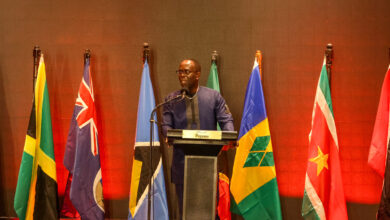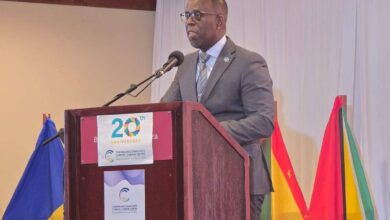Extract from Guyana Chronicle of 19 Jan, 2010) President Jagdeo touched on Information and Communication Technology (ICT) development in Guyana, stating that, hopefully, by this year end, there are going to be two new fibre optic cables coming into the country. He said Guyana Telephone & Telegraph Company (GT&T) will bring one and the Government of Guyana the other. “I am told that the cost of a megabyte per second will fall by 83 per cent, what we have to pay will be 17 per cent of what we are paying for it now,” President Jagdeo indicated. THREE CABLES”If costs were to come down and, because of the fibre cable we have now, we will have three cables in Guyana, rather than the one through French Guiana and Suriname, which is often cut and with no redundancy, no reliability. Then we will be able to generate a whole series,” he informed. President Jagdeo said he thinks the country can generate 25,000 ICT related jobs over five years and reduce the cost of bandwidth. “.and we are competitive in every other area with the other major outsourcing destinations, so that is about 25,000 jobs that could be generated for young people like many of them who have finished school, maybe, got two subjects CXC and don't want to go back to manual labour but want to go and work in the ICT field.” He explained: “Reducing the cost of bandwidth, making it more reliable, linking the country with fibre optic cable because we are going to build a transmission main for US$40M, starting this year from Skeldon all the way to Leonora, across two rivers that is Berbice and Demerara, so that all the power that we bring from the hydro could be transmitted around the country.
But the power, also from Skeldon factory, could be shared across the grid and we hope to put a fibre cable linking the entire coast.” Continuing, he said: “So, if we have good fibre cable and all of that, then we would be able to do a number of other things.” He said Government services can be improved: “We will have an e-health system, e-government system, e-security, e-education, using ICT to better deliver the curriculum, using ICT for security purposes – so you can have 5,000 cameras across the country at all the crossings etc., instantaneously giving you images back to an intelligence assessment analysis centre.” President Jagdeo said that move can enhance all of the modes. “So, rather than you having to go to Georgetown for any Government service, you can stay in your home on the computer and get those services.” He went on: “Then education is critical and I made the point that we will have to find a way of giving people cheap access to the Internet and ensure that every family, particularly poor families, all have a computer so we are thinking about, in a next few years, to start buying large numbers of computers – 50,000 computers to give to poor families. “Because, if richer and middle income people can afford this and then the poor people children can't, then what happens is that there is a big digital divide between them. “And, if you are going to deliver more of the curriculum using the computer, and if people using the Internet can now learn, use it as a learning tool and they don't have the Internet or a computer, then they will be left behind and we don't want any child, because their parent is poor, left behind. So, rather than giving it to them in school, we will give every household.” President Jagdeo insisted that this will have a big transformative impact on the society. “People can stay at home and work for a company in the United States, if they have the right skills and we can train a lot of people to do this, like medical transcription, or a whole range of other services.They don't, necessarily, have to travel abroad, because they have access and they have reliable bandwidth.





